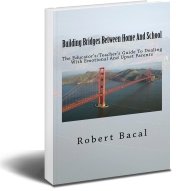What Are Kids Learning From The 2016 USA Election Campaign, and What Parents and Teachers Can Do About It By Robert Bacal
It seems like we are in the midst of the ugliest Presidential political campaign in the last several decades. And at this writing (March, 2016) we aren't even in shouting distance of an election.
We watch the debates (or not), but it's impossible to escape the rhetoric of the current politicians vying for the Republican nomination (although no doubt the Democrats are also able to be similarly unpleasant). We still have a good six months to the election.
Personal attacks are a regular daily part of the process. Fueled by candidate desperation, the media plays up the attacks, both serious, and silly. The public, while barely invested in an election process where some 50% do not vote, certainly is up for a scandal. Who needs Kanye or the Kardashians when we have Trump, and his assorted opponents.
What About The Children? What Are They Learning?
This may be the first election where we can say we'd rather our children DO NOT hear about the campaign -- that they do not hear the tactics, strategies and so on. Of course children need to learn how democracy works, but is this what we want them to learn?
- That bullying is an OK strategy to get what you want, since the most powerful people in the country are doing it publicly?
- That somehow it's better to attack the person, rather than to offer criticism on the issues, and lord forgive, offer better ways of doing things?
- That the rich and powerful can be loose with their facts and figures, or lie in public to get their ways?
- That it's OK to make excuses when one makes a mistake, or blame others (like the media), and that it's often best to simply deny every mistake?
- That it's OK to label people and use name calling to win a debate: fascist and commie are two that come to mind.
If you put aside whatever partisan political feelings you have, I'm sure you can come up with a number of other things we do NOT want children to learn from watching this election unfold.
Some Psychology On Observational Learning
A number of years ago, Albert Bandura observed that humans learn a tremendous amount by watching others. That kind of learning is called observational learning. He discovered that people can:
- learn new behaviors just by watching
- have existing behaviors reinforced, or "dishinhibited" That means that when people (particularly kids) see someone doing something they themselves wouldn't ordinarily do, they will be more likely to exhibit that behavior if the person observed is of high status, powerful, etc.
Our concern is clearly the latter. We have a number of rich, powerful, omni present role models who, through their own behavior, are actually encouraging kids to bully, label, personally attack, make fun of others.
The presidential candidates are fostering bad behavior in kids, but also in adults. Adults are also subject to this kind of learning.
What Teachers and Parents Can Do To Protect Their Kids From Bad Influences -- The Presidential Race
Like any situation, the key is to communicate, rather than ignore the situation. It's impossible to stop kids from hearing the latest candidate taunts and insults, even if the kids aren't tuning in deliberately. So, you need to open lines of communication to the kids.
- Consider watching some of the debate snippets with your class, if a teacher, or with your kids at home. Get the discussion going, by asking questions that require children to reflect on how they would feel if they were being treated as the opponents in the debate.
- Ask them how they feel about what they see, about what they understand about what going on about them in this presidential race. LISTEN. It's often best to lead kids along a path to conclusions about bullying than to dictate your opinions. Let them drive the bus.
- Help them bridge the gap between what they see and hear as part of the campaigns and their own life space -- the playground, or classrooms, and so on. There are incredible parallels kids can draw for themselves, in fact without understanding any of the political issues, so grievous are the attacks by the combatants.
- You can also bridge the gap between the campaign and family life if it's appropriate. How arguments can get heated and out of control. How it's so easy to hurt someone, and that it's worth being careful with words.
Conclusion
During the last several decades we have made at least some gains in teaching kids about bullying, conflict, name calling and similar actions. In fact we've spent a lot of taxpayers dollars on this because we deem it important.
Don't let the current crop of political candidates take away those gains by teaching children the wrong ways to communicate and interact.
The ONLY way to try to develop the next generation into constructive communicators is to be firm about the fact that no matter who bullies, or who attacks, that it's not "right", and it's not useful.
And, of course, it's not about the far future, but also about the way kids interact at school and at home.
 Now Available in
Now Available in 